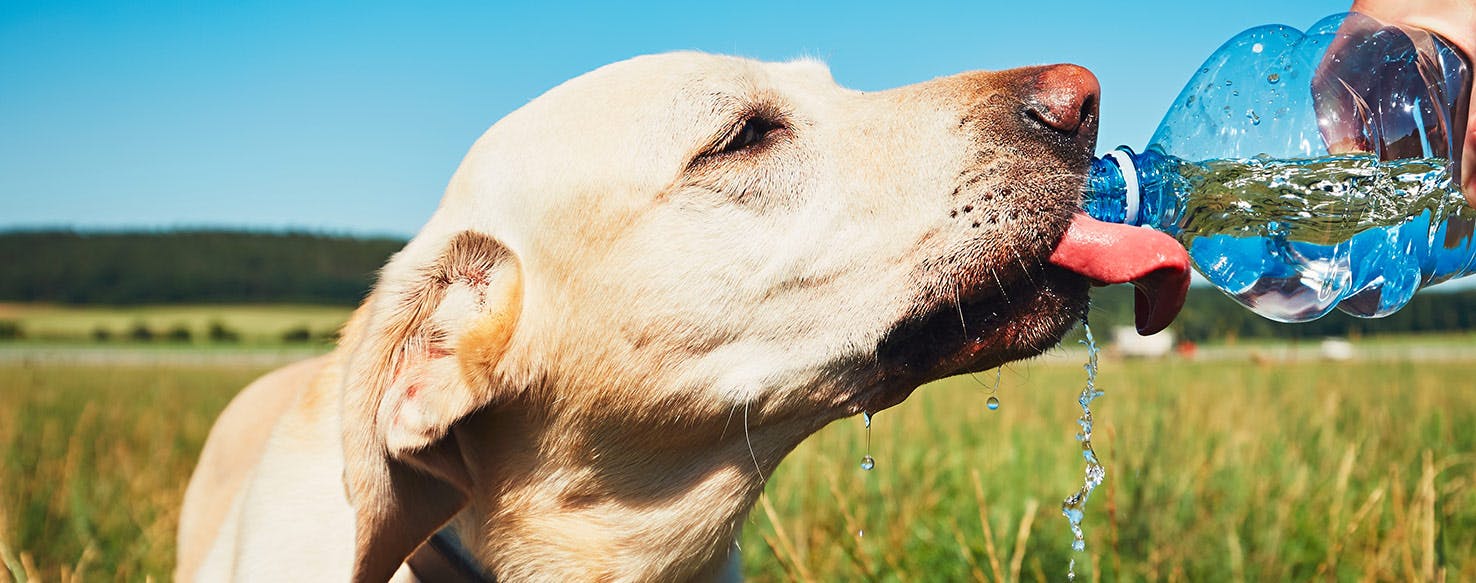
Save on pet insurance for your pet
You don't have to choose between your pet and your wallet when it comes to expensive vet visits. Prepare ahead of time for unexpected vet bills by finding the pawfect pet insurance.
You, like me probably can’t help but talk to your dog about your daily highlights and problems. You probably can’t help but snuggle up with them on the sofa in the evenings too. But can your much-beloved dog, suffer the same kinds of illnesses as we humans do? Take dehydration for example, when the human body is deprived of water, the brain is deprived of essential fuel. This can be serious and even cause death. If your dog were to be dehydrated, you would need to proceed with caution, to ensure you don’t damage an already frail and weakened body. But can dogs even suffer from dehydration like us?
Can Dogs Get Dehydrated?
YES!
Although people might think, because dogs drink much less water than us each day, and because their brains don’t operate to the same levels as humans, that perhaps dogs can’t really get dehydrated. But, it is absolutely possible for a dog to get dehydrated, and the repercussions could be serious!
Is My Dog Dehydrated?
If your dog becomes severely dehydrated, his organs could stop functioning and he could even die. So look out for these vital symptoms. Does your dog seem more lethargic than usual? Has your dog completely lost its appetite? Does he have sunken eyes? Is his mouth abnormally dry? Plus, does your dog seem down and depressed? All of these can be signs that your dog is suffering from serious dehydration.
While the cause of dehydration may seem obvious, there are instances where it can happen rapidly, without owners being aware. Dehydration happens when your dog’s fluid levels have dropped below a certain point. This can happen because of reduced water intake, but it can also happen as a result of increased fluid loss! This can happen when dogs are over heated out on a summer walk, for example. But it can also come about from diarrhea and vomiting.
Diagnosing dehydration is straightforward. A vet will undertake a physical examination. They will conduct simple tests like pinching the skin at the top of the head-- if it’s full of moisture it should spring back swiftly into place.
How Do I Treat My Dog’s Dehydration?
The main course of treatment for your dog will be replenishing their fluid levels. However, this needs to be done carefully and incrementally. Firstly, the vet will establish how much fluid has been lost and therefore needs to be given to your dog. With mild dehydration, your dog may be able to drink on its own when given enough water. But for severe dehydration, your dog may need assistance in getting the fluids back inside. Fluid will be administered either subcutaneously or intravenously. Through an IV is the quickest and most direct way to replenish your dog’s fluid levels.
It is vital your dog is treated for dehydration rapidly. If left untreated, it can cause shock, a range of illnesses, and even death!
Fortunately, dogs usually recover quickly from dehydration. Ensure they have water to drink, also give them electrolytes if they have been suffering with diarrhea and vomiting. If they cannot hold the water down, try giving them an ice cube to lick. You should see signs of improvement within a few hours, but could take up to a few days depending on the severity of the case.
Useful insights into real life examples of why dogs get dehydrated and answers to FAQs may help your understanding.
How Is Dehydration Similar in Dogs, Humans and Other Animals?
For the most part, there are a lot of similar symptoms of dehydration that can be seen in humans, dogs, and other animals. Some of these similar traits of dehydration are as follows:
-
Dogs, humans and other animals can all feel lethargic and even struggle to move if severely dehydrated.
-
All will also suffer from an abnormally dry mouth.
-
Both dogs and humans will suffer from impaired brain activity--an inability to undertake normal daily tasks.
-
Both dogs and humans will see a significant decrease in urine output.
-
Both may also have a loss of appetite.
How Is Dehydration Different in Dogs, Humans and Other Animals
In many ways, dogs, humans and other animals appear to have very similar symptoms when they are dehydrated. There are also a few differences in the way dehydration manifests itself. Some of these differences are:
-
Dogs may pant excessively, you will be able to hear and see they are panting. This is not the case in humans.
-
Dogs will not jump up from their bed when it is dinner time and may barely bat an eyelid when it’s time for their walk.
-
Dogs may be unable to muster the strength to bark or even whimper.
Case Study
Rocky, a Pomeranian cross, aged 15 years, was suffering with dehydration for three days. He wasn’t eating anything, he was lethargic, he had sunken eyes and had been vomiting. The vet not only helped save his life by giving him intravenous therapy, plus an injection for fever, but the vet also conducted some blood tests--because of Rocky's age, kidney disease was a concern. The results showed kidney disease could well have been the cause of the dehydration and the vet and owner took steps to treat that. This case showed the importance of fast acting measures like IV fluid therapy, but that also underlying diseases can cause dehydration too, and it is vital to get them diagnosed!
You may also like
